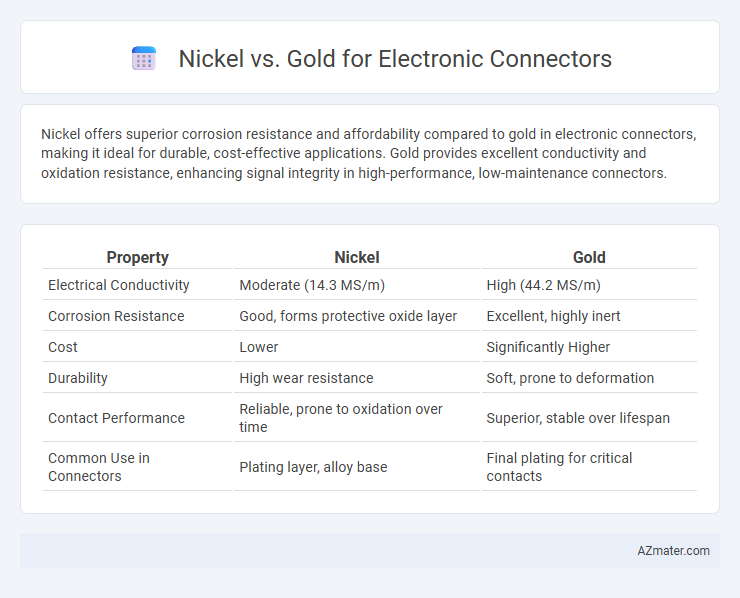Nickel offers superior corrosion resistance and affordability compared to gold in electronic connectors, making it ideal for durable, cost-effective applications. Gold provides excellent conductivity and oxidation resistance, enhancing signal integrity in high-performance, low-maintenance connectors.
Table of Comparison
| Property | Nickel | Gold |
|---|---|---|
| Electrical Conductivity | Moderate (14.3 MS/m) | High (44.2 MS/m) |
| Corrosion Resistance | Good, forms protective oxide layer | Excellent, highly inert |
| Cost | Lower | Significantly Higher |
| Durability | High wear resistance | Soft, prone to deformation |
| Contact Performance | Reliable, prone to oxidation over time | Superior, stable over lifespan |
| Common Use in Connectors | Plating layer, alloy base | Final plating for critical contacts |
Introduction: The Importance of Connector Materials
Nickel and gold are critical materials in electronic connectors due to their unique electrical conductivity and corrosion resistance properties. Gold offers superior conductivity and excellent resistance to oxidation, making it ideal for high-reliability applications such as aerospace and medical devices. Nickel provides a cost-effective alternative with strong mechanical durability and good conductivity, commonly used in consumer electronics where budget considerations are paramount.
Overview of Nickel and Gold in Electronics
Nickel offers robust corrosion resistance and excellent mechanical strength, making it a common choice for electronic connectors requiring durability and cost efficiency. Gold provides superior electrical conductivity and exceptional resistance to oxidation, ensuring reliable signal transmission and long-term performance in high-precision electronics. Combining a nickel underlayer with a gold plating optimizes both mechanical protection and conductivity for demanding connector applications.
Conductivity Comparison: Nickel vs Gold
Gold offers superior electrical conductivity compared to nickel, with a conductivity rating of around 44.2 million siemens per meter (MS/m), whereas nickel averages approximately 14.3 MS/m. This significant difference makes gold the preferred choice for electronic connectors requiring minimal resistance and reliable signal transmission. Nickel, while more cost-effective and corrosion-resistant, sacrifices conductivity, potentially leading to higher contact resistance and signal loss in high-performance applications.
Corrosion Resistance: Which Performs Better?
Nickel offers excellent corrosion resistance, forming a protective oxide layer that shields electronic connectors from moisture and oxidation, especially in harsh environments. Gold surpasses nickel in corrosion resistance by providing a non-oxidizing, inert surface that maintains consistent electrical conductivity and prevents signal degradation over time. For electronic connectors exposed to aggressive conditions or high humidity, gold plating ensures superior longevity and reliability, although nickel often suffices for standard applications with moderate environmental exposure.
Durability and Longevity of Nickel and Gold Connectors
Nickel connectors offer high durability with excellent resistance to corrosion and wear, making them suitable for applications exposed to harsh environments and frequent mating cycles. Gold connectors provide superior longevity due to their exceptional conductivity and oxidation resistance, ensuring consistent performance over extended periods without signal degradation. While nickel is cost-effective and robust, gold plating on connector surfaces significantly enhances lifespan by preventing tarnish and maintaining low contact resistance in critical electronic connections.
Cost Analysis: Economic Considerations
Nickel offers a cost-effective solution for electronic connectors due to its lower raw material price and widespread availability compared to gold. Gold provides superior corrosion resistance and electrical conductivity but significantly increases manufacturing costs, especially in high-volume production. Cost analysis often favors nickel for budget-sensitive applications while reserving gold for critical connectors requiring long-term reliability and minimal signal loss.
Solderability and Manufacturing Factors
Nickel plating offers excellent corrosion resistance and hardness, but its solderability can be challenging due to the formation of an oxide layer that hinders solder wetting, often requiring flux or pre-tinning during manufacturing. Gold plating provides superior solderability with low contact resistance and excellent surface conductivity, making it ideal for high-reliability electronic connectors, though it incurs higher material costs and requires precise control to avoid embrittlement. Manufacturing with nickel involves more complex surface preparation and post-treatment steps, whereas gold-plated connectors streamline soldering processes but demand careful thickness optimization to balance performance and cost.
Applications: Where Nickel or Gold is Preferred
Nickel is commonly preferred in electronic connectors for applications requiring robust corrosion resistance and mechanical strength, such as in industrial and automotive connectors. Gold is favored in high-performance, low-resistance applications like telecommunications and aerospace due to its excellent conductivity and oxidation resistance. Selection depends on environmental factors and signal integrity needs, with gold ideal for critical signal paths and nickel suited for durability under harsh conditions.
Environmental Impact and Sustainability
Nickel plating in electronic connectors offers excellent corrosion resistance but raises environmental concerns due to toxic nickel compounds released during mining and processing. Gold provides superior conductivity and corrosion resistance with a more sustainable profile, as it is highly recyclable and less harmful to ecosystems. Choosing gold over nickel reduces hazardous waste and supports circular economy practices in electronics manufacturing.
Conclusion: Choosing the Right Connector Material
Nickel offers excellent corrosion resistance and durability, making it a cost-effective choice for electronic connectors in harsh environments. Gold provides superior electrical conductivity and resistance to oxidation, ensuring reliable signal transmission and long-term performance in high-precision applications. Selecting the right connector material depends on balancing the required conductivity, environmental exposure, and budget constraints to optimize performance and longevity.

Infographic: Nickel vs Gold for Electronic Connector
 azmater.com
azmater.com